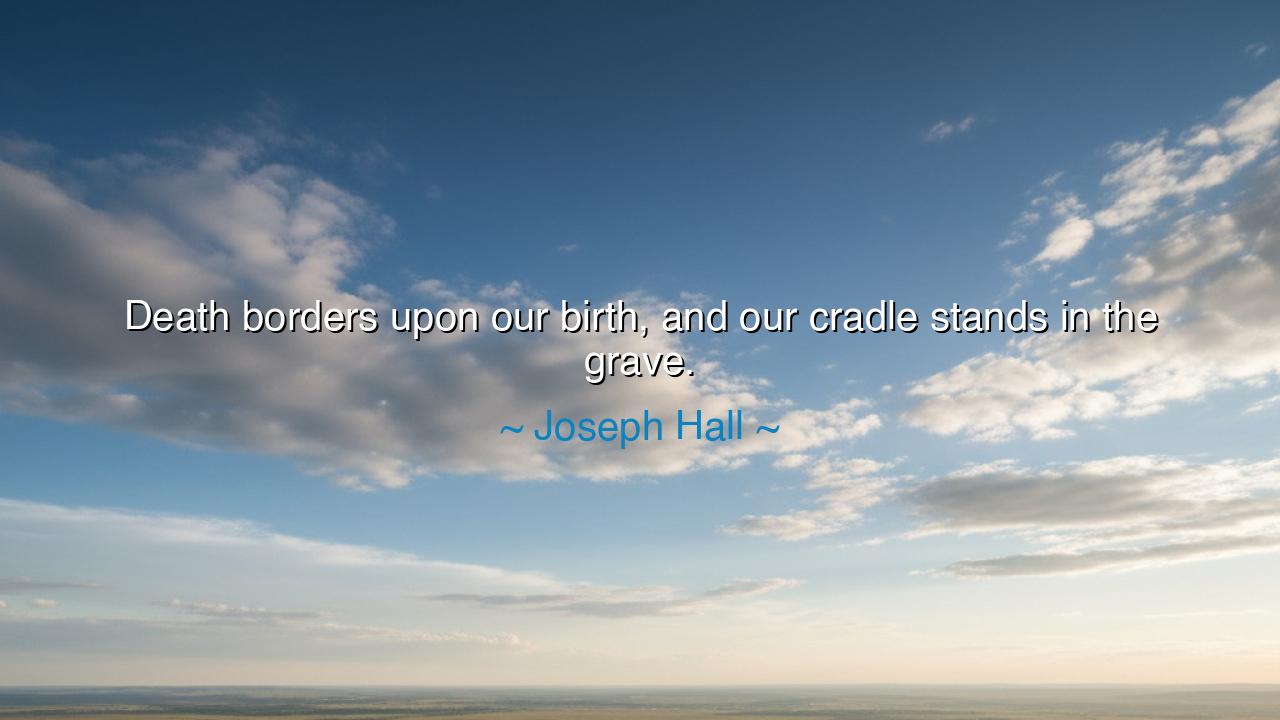
Death borders upon our birth, and our cradle stands in the grave.






“Death borders upon our birth, and our cradle stands in the grave.” Thus spoke Joseph Hall, a wise voice from the age of the seventeenth century, when men pondered life not as a straight road, but as a circle returning upon itself. In this solemn saying lies a truth as ancient as the stars: that life and death are not enemies, but neighbors, bound together in a sacred dance. The moment we are born, the shadow of mortality leans close—not to frighten us, but to remind us that time is precious, and that every breath is a loan from eternity.
To the ancients, such reflections were not grim musings, but gateways to wisdom. They knew that to remember death is to live deeply. The Egyptians built pyramids not merely to honor kings, but to proclaim that mortality is the mirror of meaning. The Greeks carved their tragedies from the fragile thread of life, understanding that only those who accept their end can taste the sweetness of existence. Joseph Hall, in his meditations, spoke as one who saw that the child’s first cry is echoed by the whisper of the grave—that the two are but different doors of the same house.
Consider the life of Marcus Aurelius, the philosopher-emperor of Rome. Though he ruled the vast empire, he never forgot that he was dust clothed in flesh. He wrote: “You could leave life right now. Let that determine what you do and say and think.” To him, as to Hall, the awareness of death was not despair—it was clarity. It stripped away vanity, greed, and fear, revealing the essence of virtue. Marcus ruled with justice because he understood that power dies, but character endures. His empire crumbled with time, yet his wisdom still reigns in the hearts of those who seek truth.
The meaning of Hall’s words is not that we should weep at our fate, but that we should awaken to its urgency. If our cradle indeed stands in the grave, then every sunrise is a gift borrowed from darkness. To live with this knowledge is to see the sacredness in the ordinary—to hold one’s child tighter, to speak kindness without delay, to forgive before the night falls. Those who live as though they will never die often waste their days in trivial pursuits; but those who remember death live as though each moment were eternity itself.
There was once a samurai named Yamamoto Tsunetomo, who said that the way of the warrior is found in death. He did not mean a longing for destruction, but a freedom from fear. To live with death at one’s side is to live fully awake. The warrior who accepts his fate fights with calm spirit; the artist who accepts mortality paints with fire; the lover who knows time is short loves with unshakable tenderness. Hall’s words, though written in a Christian age, breathe the same timeless wisdom: death gives shape to life, as the shore gives shape to the sea.
If our cradle stands in the grave, then we must learn to cherish the fleeting. Let the laughter of today not be postponed to tomorrow. Let no word of love remain unspoken. Let no dream remain untried. For the soil that shall one day cover us is the same that nourishes us now. Death is not an interruption of life, but its completion—its closing note, which gives meaning to the song.
The lesson is thus: do not turn away from death; turn toward it with open eyes. Let it be your teacher, your silent companion. Let it remind you to live with honor, gratitude, and presence. Each morning, when you awaken, whisper to yourself, “This day is not owed to me—it is given.” Each night, when you sleep, let your heart rest in peace, for you have lived one day as though it were your last.
So, my child of the living dawn, remember this: from the grave we are born, and to the grave we return—but between those two shadows burns the light of the soul. Guard that light well. Let it not flicker in fear, nor dim with neglect. Live with courage, love with fullness, and when your final hour comes, you shall find that death was not a stranger waiting at the end, but a friend who has walked beside you from the beginning.






AAdministratorAdministrator
Welcome, honored guests. Please leave a comment, we will respond soon